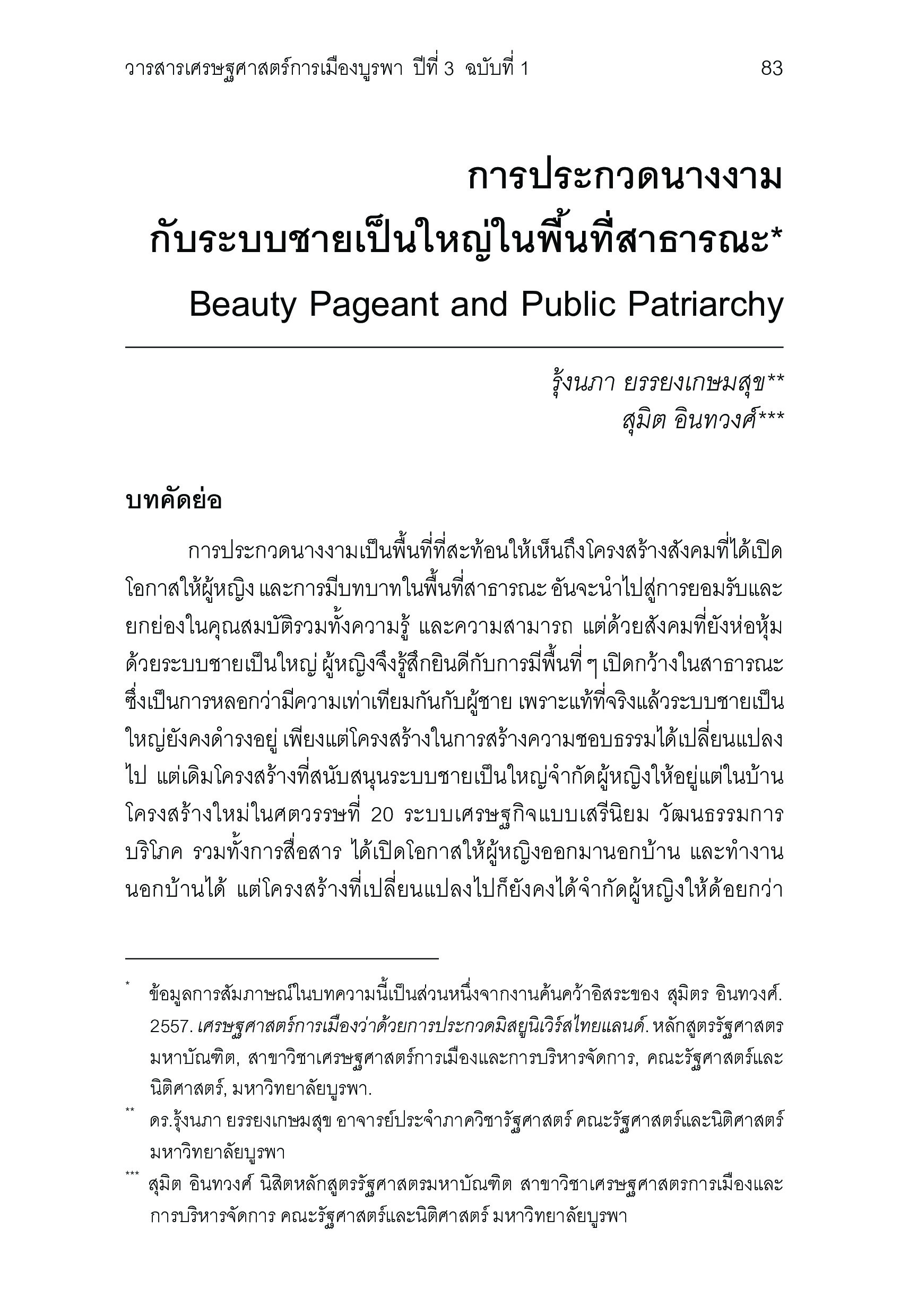Beauty Pageant and Public Patriarchy
Keywords:
Beauty Pageant, Public Patriarchy, Miss Thailand UniverseAbstract
Beauty Pageant is a space that mirrors the social structure which open an opportunity to women and their role in public areas which led to the recognition and praise in women’ qualification, knowledge and abilities. Women feel welcomed widen public area while society has been covered by patriarchy and the equality is not for real. Patriarchy still exists but structures which gave the legitimacy to patriarchy were changed. In the past, structures which supported patriarchy restricted women in the household. New structures in 20th century, liberal economic, consumer culture and communication give opportunities to women to go outside and to work in workplace. Hence, changed structures still force women as inferior via employment, segregation and collection.
References
จังหวัดร้อยเอ็ด. (2557). VTR รวมกิจกรรมเก็บตัวผู้เข้าประกวด Miss Universe Thailand 2014 ที่จ.ร้อยเอ็ด. วันที่ค้นข้อมูล 10 มีนาคม 2558, เข้าถึงได้จาก http://roiet.nfe.go.th/clipvdo.php?id=0010.
ชาตรี ประกิตนนทการ. (2548). คณะราษฎรฉลองรัฐธรรมนูญ: ประวัติศาสตร์การเมืองหลัง 2475 ผ่านสถาปัตยกรรม "อำนาจ". กรุงเทพฯ: มติชน.
ไทยรัฐออนไลน์. (2557, 27 เมษายน). คัดเหลือ 40 สาวงาม มิสยูนิเวิร์สไทยแลนด์. วันที่ค้นข้อมูล 12 มีนาคม 2558, เข้าถึงได้จาก http://www.thairath.co.th/content/419038.
นางสาวไก่ไม่กา (นามสมมติ). (2558, 4 มีนาคม). หนึ่งในผู้เข้ารอบ 40 คนสุดท้าย. สัมภาษณ์.
ปังปอนด์ (นามสมมติ). (2558, 7 มีนาคม). ผู้สื่อข่าววงการบันเทิง และเป็นหนึ่งในผู้เข้าร่วมการประกวด. สัมภาษณ์.
พันธุ์ทิภา ศกุณต์ไชย (ผู้ผลิต). (2557, 27 พฤษภาคม). ล้วงตับสลับไต [รายการโทรทัศน์]. กรุงเทพฯ: ไทยทีวี.
เพ็ญสุภา สุขคตะ ใจอินทร์. (2554). ‘คอลัมภ์ ปริศนาโบราณคดี’. ใน มติชนสุดสัปดาห์, 16 ธันวาคม 2554, หน้า 76.
วิศนไชย นันท์พละวงษ์. (2558, 8 มีนาคม). ผู้ช่วยฝ่ายดูแลผู้เข้าประกวด. สัมภาษณ์.
สาวน้อย (นามสมมติ). (2558, 5 มีนาคม). เจ้าหน้าที่กองประกวด ฝ่ายจัดเตรียมการประกวด. สัมภาษณ์.
สำนักข่าวอิสรา. (ม.ป.ป.). เปิดปมธุรกิจ “จันทร์ 25”ในอุ้งมือ “คุณแดง”ก่อนเปิดเกมรุกเอาคืนช่อง7. วันที่ค้นข้อมูล 16 มีนาคม 2558, เข้าถึงได้จาก http://www.isranews.org/เรื่องเด่น-สำนักข่าวอิสรา/item/24151-business_24151.html.
สุมิตร อินทวงศ์. (2557). เศรษฐศาสตร์การเมืองว่าด้วยการประกวดมิสยูนิเวิร์สไทยแลนด์. งานค้นคว้าอิสระ หลักสูตรรัฐศาสตรมหาบัณฑิต, สาขาวิชาเศรษฐศาสตร์การเมืองและการบริหารจัดการ, คณะรัฐศาสตร์และนิติศาสตร์, มหาวิทยาลัยบูรพา.
MTHAI. (2557). แอลลี่ พิมบงกช รับมงกุฎ มิสยูนิเวิร์สไทยแลนด์ แทน ฝ้าย เวฬุรีย์ ที่สละตำแหน่ง. วันที่ค้นข้อมูล 12 มีนาคม 2558, เข้าถึงได้จาก http://women.mthai.com/amazing-women/172318.html.
Oknation. (2553, 20 กรกฎาคม). 18มงกุฎบนเวทีประกวดนางสาวไทย..เผยภาพสมเด็จพระนางเจ้ารำไพพรรณี..ในหลวงและพระสมเด็จพระราชินีเสด็จฯ. วันที่ค้นข้อมูล 12 มีนาคม 2558, เข้าถึงได้จาก http://www.oknation.net/blog/buzz/2010/07/20/entry-1.
Lesley, J. & Justine, L. (2004). Sentences to Everyday Life: Feminism and the Housewife. New York: Berg Publishers.
Murray, M. (1995). The Law of the Father? Patriarchy in the Transition from Feudalism to Capitalism. New York: Routledge.
Walby, S. (1991). Theorising Patriarchy. Oxford: Basil-Blackwell.






